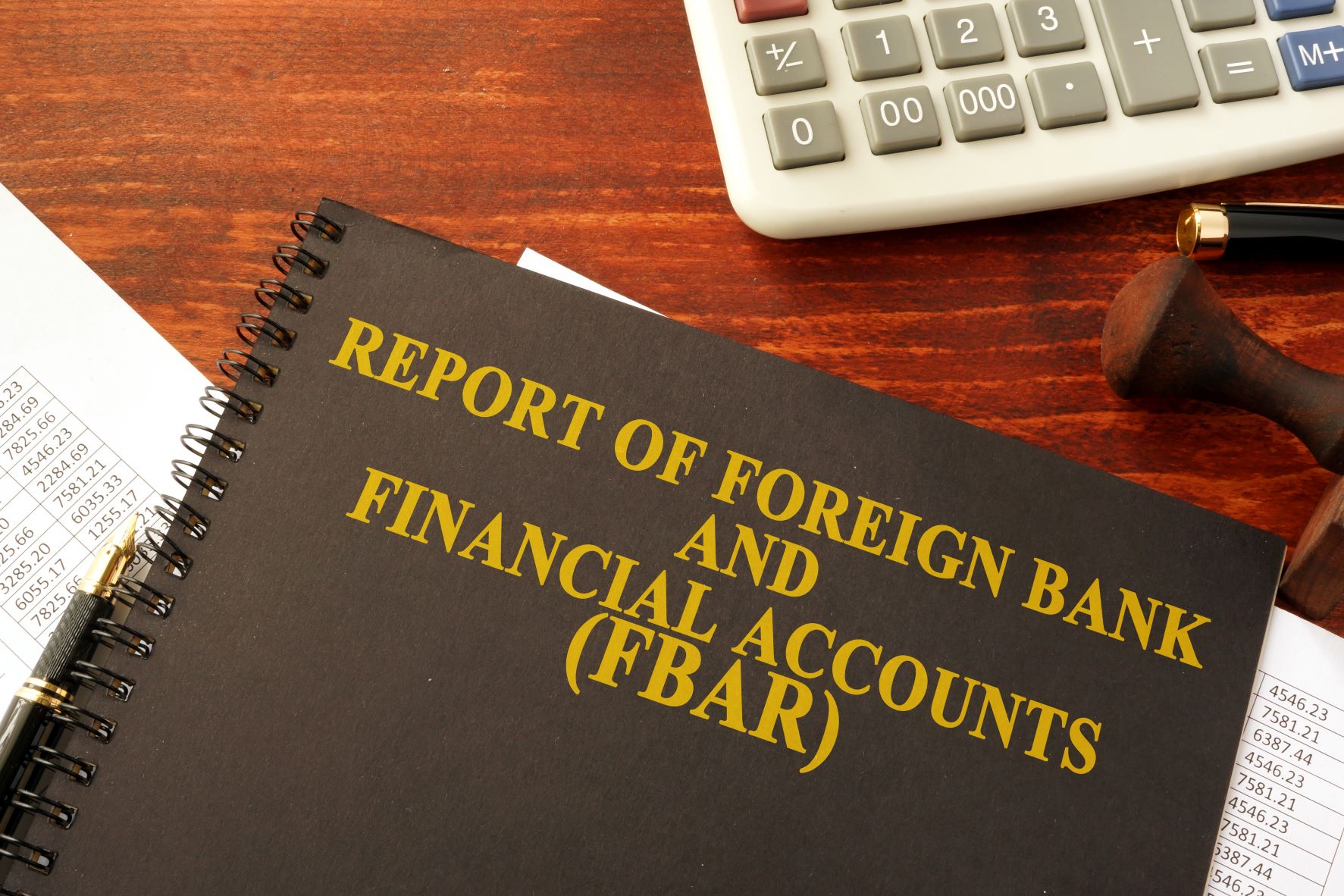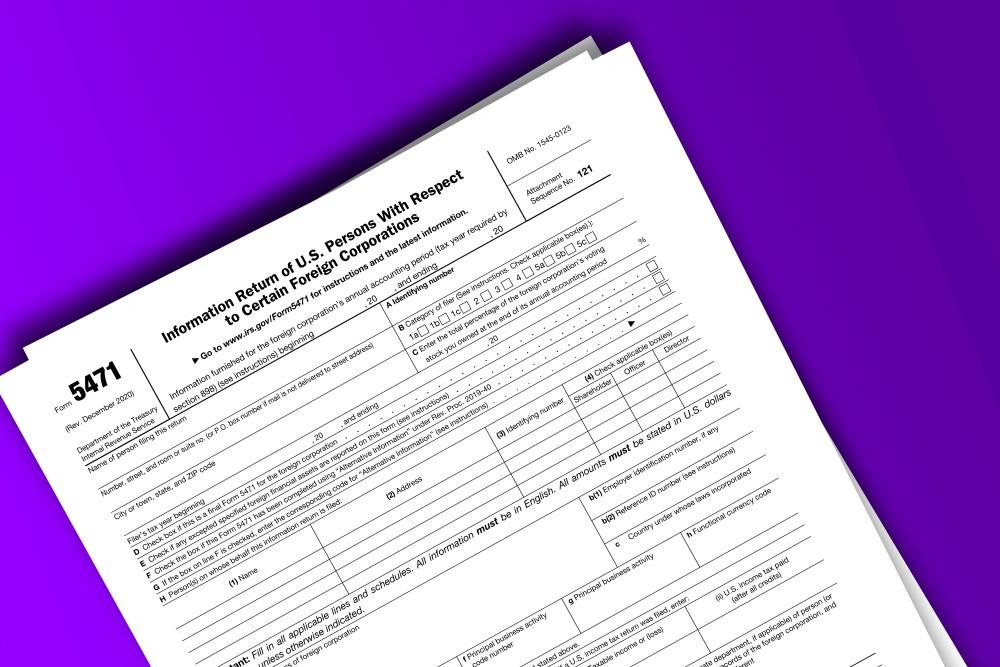Reporting My Foreign Bank and Financial Accounts

Under the Bank Secrecy Act, formerly known as the Currency and Foreign Transactions Report Act of 1970, Congress enacted the requirement that certain foreign bank and financial accounts must be reported by United States taxpayers by filing a Report of Foreign Bank and Financial Accounts (“FBAR”).
What is an FBAR?
An FBAR is a Foreign Bank Account and Financial Asset Report, which is filed on FinCEN Form 114. Congress’s rationale for requiring the reporting of foreign bank accounts and financial assets is simple – to prevent tax evasion. Although the IRS retains civil FBAR enforcement authority, FinCEN Form 114 must be filed with the U.S. Treasury Department’s Financial Crimes and Enforcement Network.
Who Must File?
According to Treasury Regulation (“Treas. Reg.”) § 1010.350:
Each United States person having a financial interest in, or signature or other authority over, a bank, securities, or other financial account in a foreign country shall report such relationship to the [IRS] for each year in which such relationship exists and shall provide such information [by filing FinCen Form 114] or any successor form.
A “United States person” includes:
- A citizen of the United States;
- A resident of the United States;
- A corporation, partnership, limited liability company; and
- A trust or estate.
Reportable accounts include the following:
- Bank accounts;
- Securities accounts; and
- Other financial accounts, such as mutual funds or investment funds.
The FBAR regulations require that the United States person file an FBAR to report such financial interests if the aggregate value of the reportable foreign financial accounts exceeds $10,000, valued in U.S. dollars, at any time during the calendar year reported. It is important to note that almost any account at a financial institution located outside the United States is considered a reportable foreign financial account.
When to File
The FBAR must be filed by April 15th following the calendar year being reported; however, taxpayers required to file an FBAR are allowed an automatic extension to October 15th without the need to request an extension. Such an extension, however, requires that the taxpayer file Form 4868 required in order to obtain an automatic extension of their tax return filing deadline.
How to File
To file the FBAR, FinCEN Form 114 will be submitted to the Treasury Department electronically using the BSA E-Filing System.
For married taxpayers, if spouses jointly own foreign accounts and neither one owns any other foreign accounts, then the couple can file a single FBAR. Otherwise, each spouse must file their own FBAR.
Submitted forms must contain the following information:
-
- Financial account numbers;
- Maximum value of all foreign financial accounts and assets in USD using the year-end exchange rate;
- Name and address of the financial institution where the accounts are held;
- Name(s) on the accounts; and
- Types of accounts.
Recordkeeping Requirements
It is imperative to maintain records and file reports when making foreign transactions. 31 U.S.C. § 5314 directs the Secretary of Treasury to require a U.S. citizen or resident to maintain records and file reports when making transactions with a foreign financial agency. Moreover, Treas. Reg. § 1010.420 requires the maintenance and retention of FBAR records for a period of five years.
Like the submission requirements stated above, records must contain the following information:
-
- Financial account numbers;
- Maximum value of all foreign financial accounts and assets in USD using the year-end exchange rate;
- Name and address of the financial institution where the accounts are held;
- Name(s) on the accounts; and
- Types of accounts.
Although there is no specific type of document listed that explicitly meets the recordkeeping requirements, examples include bank statements or a copy of the previously filed FBAR.
Penalties
Overview and Authority
Under Treas. Reg. § 1010.810(g), the IRS has been delegated the authority to assess and collect civil FBAR penalties. The IRS has the authority to investigate apparent FBAR violations and assess and collect civil penalties for violations of the reporting and recordkeeping requirements. Accordingly, U.S. persons failing to file FBARs may be subject to civil or criminal penalties for FBAR reporting or recordkeeping violations. However, the assertion of civil or criminal penalties depends on the facts and circumstances.
In the event of an FBAR violation, the IRS will first issue Letter 3800, which is a warning letter regarding apparent FBAR violations. The IRS may also determine a penalty without issuing a Letter 3800 in the event that multiple years are under examination and civil penalties have been imposed on some, but not all, of the years under examination.
Penalty Structure
Depending on the severity of the violation, the IRS may assess the following civil penalties for FBAR violations:
-
- 31 USC 5321(a)(5)(A) and (B) – The IRS may impose a civil penalty on any person who violates FBAR reporting or recordkeeping requirements. In general, the amount of any civil penalty shall not exceed $10,000.
- 31 USC 5321(a)(5)(C) – In the case of any person willfully violating, or willfully causing any violation of the FBAR reporting or recordkeeping requirements, the maximum penalty shall be increased to the greater of $100,000 or 50 percent of the amount involved in a transaction or the balance of the account at the time of the violation.
- 31 U.S.C. § 5321(a)(6)(A) – Civil penalties of not more than $500 on any financial institution or nonfinancial trade or business which negligently violates FBAR reporting requirements.
- 31 U.S.C. § 5321(a)(6)(B) – If any financial institution or nonfinancial trade or business engages in a pattern of negligent activity, the IRS may impose a civil penalty of not more than $50,000 on the financial institution or nonfinancial trade or business.
Under 31 U.S.C. § 5321(d), it is important to note that a civil penalty may be imposed for an FBAR violation regardless of whether a criminal penalty was imposed for the same violation.
Penalty Mitigation
According to the Bank Secrecy Act, the IRS must examine the facts and circumstances of each case. As a result, the FBAR examiner may determine that the facts and circumstances do not warrant a penalty. Where there has been an FBAR violation but the examiner does not believe a penalty is appropriate, the examiner will issue Letter 3800.
To qualify for mitigation, the U.S. person must meet the following four criteria:
- The person does not have a history of criminal tax or Bank Secrecy Act convictions for the preceding 10 years and does not have a history of prior FBAR penalty assessments;
- No money transferred through the foreign financial accounts associated with the U.S. person was from illegal sources or activities or used to further a criminal purpose;
- The U.S. person cooperated during the examination; and
- The IRS did not determine that a fraud penalty for an underpayment of income tax for the tax year in question was appropriate due to the failure to report income related to any amount in a foreign account
Filing Delinquent FBARs
Filing a delinquent FBAR or failing to file the FBAR at all is a violation and may subject the U.S. person to the penalties listed above. To limit potential exposure, it is advised that all delinquent FBARs be filed as early as possible.
If you or someone you know needs the assistance of a tax professional to either file FBARs or seek FBAR penalty mitigation, contact The Wilson Firm today to schedule a consultation.





